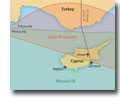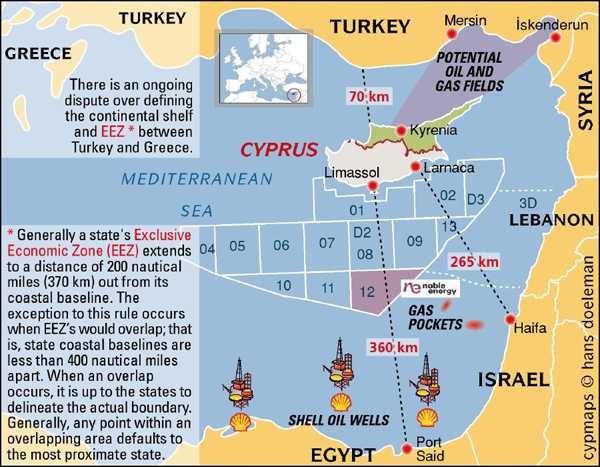
The Greek Cypriot Administration (GCA), finally managed to convey the artificially created petrol crisis based on the hydrocarbon exploration in her so called “Exclusive Economic Zone” in to the EU and European Parliament.
Actually this was the target of the GCA, to create a dispute with Turkey and push Europe as a whole to deal with political issues provoked artificially by her self, with Turkey.
Turkey is not a party to the UN Convention on the Law of the Sea, UNCLOS, due to the continental shelf demands of Greece for her Dodecanese islands in Aegean sea. Turkey duly did not accept the 12 nautical miles width of the territorial waters of the Dodecanese islands as declared by Greece on the bases of UNCLOS and noted this act as “Casus Belli”, a “Cause of war”.
All the European countries recognized UNCLOS and are part of this Convention. According to UNCLOS, declaration of an Exclusive Economic Zone by an independent state strictly requires mutual agreement’s of the neighbor states around.
Since Turkey is not a part of this convention, she already possesses her previously declared southern Continental Shelf stretching 200 nautical miles southwards starting from the baseline joining Gazipasha, the eastern tip of Antalya bay, with Kash, the western tip of Antalya Bay, according to the 1958 Geneva Convention.
GCA had signed an Economic Cooperation agreement with Greece years before. Now she signed and agreement with Egypt delimiting their respective economic zones and providing for detailed offshore cooperation, while she also has agreed with Lebanon on a similar delimitation and cooperation.
The Economic Cooperation agreement with Greece, covers and delimits the seas between Rhodes island and Western tip of Cyprus, extending 200 nautical miles southwards, shuts away to Turkey the western waters of Eastern Mediterranean sea.
The Exclusive Economic Zone agreement with Egypt, covers all the waters with in Cyprus and Egypt and gives underwater sovereignty to Greece, Cyprus and Egypt.
The Exclusive Economic Zone agreement with Lebanon, covers all the waters in between Cyprus and Lebanon as well.
The target of these agreements is, to occupy Turkey’s southern Continental Shelf zone, to build a solid wall around Turkey’s southern shores and to isolate her from the seas of the Eastern Mediterranean Sea, with all the underwater and sea bed wealth underneath.
Based on the 1960 Treaty of the Establishment of the Republic of Cyprus, the March 4, 1964 dated UN resolution No. 186, passed to stop the fierce inter-communal clashes on the island, contributed to the GCA the sovereignty and the role of Governing Government of the island of Cyprus.
The protocol 10 of the Republic of “Cyprus’ Accession Agreement” to the EU, took into consideration the island of Cyprus as a single sovereign state and the GCA as the sole and only accredited “Government of Cyprus”, as well.
Article 1(1) of Protocol 10 disregards the existence of Turkish Republic of Northern Cyprus (TRNC) and partnership rights of Turkish Cypriots in the so called Greek Cyprus Government, and defines the territories under the sovereignty of TRNC as “the areas of the Republic of Cyprus in which the Government of the Republic of Cyprus does not exercise effective control”.
The trick of the artificial petrol crisis lies on extending and spreading the sovereignty of the GCA to the territorial seas of “the areas of the Republic of Cyprus in which the Government of the Republic of Cyprus does not exercise effective control”, namely the waters of TRNC, facing to Turkey, along the northern cost of the island and grasp the whole island, relying on to the 26 EU member states behind.
Ata ATUN






